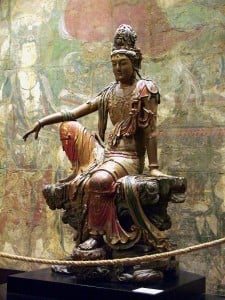In This Moment of Decision I Pray to Ganesha, Remover of Obstacles
Aum, Shri Ganeshaya namah — Great Lord of Wisdom, here I stand with so many decisions to make, with so many ways to turn. I beg for Your grace. Fill me with righteous judgment and clear discrimination as I lay all confusion at Your holy feet and immerse myself solely in You. Aum, Ganesha sharanam, sharanam Ganesha.
From Loving Ganesha by the Himalayan Academy Ch. 11 Ganapati Prarthanah: Prayers to Lord Ganesha www.himalayanacademy.com/resources/books/lg/lg_ch-11.html

IMAGE: Statue of Ganeshotsav in Maharashtra a state in India. Ganesh is a Hindu deity with the head of an elephant. He is seated on a cushion. His skin tone is pinkish beige and his elephant trunk is decorated with gold designs. One tusk is chipped. One of his four hands holds a golden ball. His feet are human like but very wide as an elephand. One foot is raised. Wikimedia Commons Public Domain.
Every community faces obstacles. Our Pagan community is facing the challenges of growth. As more and more people find Paganism, we must find ways to teach and support them. Do we have enough trained Priests, Priestesses, and clergy? Where can we safely gather? Before we can assist the hundreds of new folks who feel a connection to our beliefs, we need to over come the obstacles that face our current members. One such obstacle is accessibility for participants who have a mental, physical, sight or hearing impairment. Granted, there are some wonderful examples of open access to Pagan festivals.
In 2009, a participant offered feedback concerning ASL interpretation at PantheaCon. “I was in a ritual with a sign interpreter. I was two or three people away. I found it amazingly moving to be able to watch the ritual processed an entirely different way than anything I has experienced before. I watched the interpreter quite a bit, not because it was distracting, but because it was so beautiful to watch the song “performed”. I ended up learning the song in sign from watching the process. I feel that I had a deeper experience of the ritual because of this.” Deaf Pagan Crossroads “Accessing PantheaCon” http://deafpagancrossroads.com/2009/03/10/accessing-pantheacon/
Ganesha is Vighneshvara or Vighnaraja, is the Hindu Lord of material and spiritual obstacles. He is revered as a remover of obstacles and he also places obstacles in the path of those who need to be checked. In Gaṇeśa: Lord of Obstacles, Lord of Beginnings author Paul Courtright says “his task in the divine scheme of things, his dharma, is to place and remove obstacles. It is his particular territory, the reason for his creation.”
All of us deal with obstacles. Figuring out how to overcome an obstacle though can become a sacred act when we grow from the experience. When we accept a challenge with wisdom and dignity. Often accessibility isn’t provided at festivals until after there’s been a lot of heated dialog through letters, phone calls, and in person conferences.
A healthy group dynamic can be set up by using Professor Muneera Spence’s seven rules for collaboration:
Look for common ground: look for shared personal experiences, listen and give feedback, accept differences in perception and opinions, uncover similar values, be open about who you are and expect the same of others
Learn about others: recognize their perspectives and needs, allow others to freely express themselves
Critique results, not people: make other people feel good, personal hostility is a waste of time, avoid put downs or criticizing a person instead of their ideas
Give and get respect: respect other opinions, be considerate and friendly, have some empathy, speak with confidence and tact
Proceed slowly: check for understanding and acceptance of each idea before moving on to the next.
Be explicit and clear: observe nonverbal communication, speak clearly, select meaningful words, share ideas and feelings
Remember the five “Cs” of communication: clarity, completeness, conciseness, concreteness, and correctness
Staff of Asclepius “Building the Magical Community”http://www.patheos.com/community/paganswithdisabilities/2011/03/22/building-a-magical-community/
Here is what I’ve discovered about this obstacle so far.
The majority of Pagan organizations:
1. Are uneducated about accommodating participants.
2. Assume there aren’t enough participants who need assistance.
3. Claim they don’t have the financial or volunteer resources to provide access.
4. Are unwilling to provide more complex access such as ASL (American Sign Language) interpreters or wheelchair access to buildings since they assume registered federal non-profit status shelters them from ADA (Americans with Disabilities) law.
My husband, Michael, and I talked about how we would respond as organizers if someone asked to be accommodated. From 1998 until 2009 we assisted with various Pagan student organizations and the Order of the Elodrym. We helped plan Pagan Pride Day in Cape Girardeau, MO from 1998 until around 2002. We were planners for events and camp outs that were open to the public. The largest PPD event we ever had was 60 people which is small potatoes compared to huge national events. Hind sight showed us how unprepared we were during those early years. There weren’t any elders in our community to show us and the other organizers in their 20s how to lead a ritual let alone plan a festival that would include everyone. However, we agreed that as organizers it would have been our responsibility to assist anyone who wished to attend. We would have asked our members to help find resources or we would let the participant know we could use some help learning about how to accommodate them. Not demand the participant do something about it. He said that if an organization wants to take on the responsibility of putting on an event, the members need to handle all of the responsibilities. I agree.
The amazing thing is, my husband and I are both disabled.
I also know how frustrating it can be to round up volunteers and finances. This is when Michael provided an “ah ha” moment. If an organization’s leaders and members don’t have the motivation to at least try and provide access or they are unable to produce the funds and volunteers for a large scale event, then maybe they shouldn’t be doing it.
It takes everyone participating in different ways to make a festival or event possible. There has to be people willing to take on the responsibility of providing the event. People willing to host workshops. The event needs people to come and act responsibly while they attend.
So what responsibilities do members of the disabled, deaf, and blind Pagan community have? Right now we need to speak up about our needs and offer solutions through information. If you feel called to this path of service, you can offer to do workshops or volunteer as festival staff. Attend festivals and right letters about what you need so you can attend. Let your local community know there is a desire to attend events. Register for an event a couple of months in advance so there is enough time to meet your needs.
I will reiterate that it is the ethical and sometimes legal responsibility of organizations to provide access and not insist participants round up the resources to provide access for themselves.
The modern Pagan movement has a lot in common with the disability rights movement. Both began growing and making huge waves across society in the 60s. Our current elders were part of Paganism during the 60s and 70s.
“Social responsibility, as I use the term, refers to our involvement in trying to influence social issues for other than financial or evangelical reasons. In other words, social responsibility refers to our efforts to help others without expecting a return beyond our belief we have assisted a cause we regard as good.” Exploring the Pagan Path: Widsom from the Elders By Kristen Madden, Raven Grimassi, Starhawk Ch. 15 “Pagans, Social Responsibility, and Politics” by Gus diZerega
The problem with any religion is the human factor. We’re mammals trying to survive and once in a while we catch a glimpse of something greater than ourselves. All religious organizations are having difficulty addressing the needs of disabled members.
“Some Muslim organizations don’t accommodate people with disabilities because they say there aren’t any disabled people in their communities. But Mohammed Yousuf […] says disabled members don’t participate because organizations aren’t inclusive.” EquallyAble Foundation of India http://helphandicap.org/?p=265
I grew up in the Methodist Church and often attend functions and special services at the church in town my mom and middle sister attend. I’m actually good friends with the minister. He may not know I’m Pagan but the members who are my FB friends do. I guarantee that all religions have clashes and arguments among members. What I admire about this church is they built an access ramp and didn’t expect the disabled members to come up with the plans and money. The whole church raised the funds. My mom drew the plans and the members with construction skills built it.
It is a urban legend that Paganism has no funds. Yes, there are members who struggle from paycheck to paycheck. However, when the community comes together great things can be accomplished. In just a week, over $30,000 was raised by Pagans for Doctors Without Boarders. What if we came together to build temples or community centers? What if we came together to provide interpreters for the deaf, guides and braille brochures for the blind? Great things are possible.
“Service is part of our religion. It doesn’t have to be, but the more we include it, the stronger, healthier, and wiser we all become.” T. Thorn Coyle “Service is Power” http://www.patheos.com/Resources/Additional-Resources/Service-Is-Power-T-Thorn-Coyle-03-01-2011.html
This festival season, the Staff of Asclepius is seeking guest authors to write about their accessibility experiences at any event large or small. Writers will have the opportunity to share with the community how volunteers accommodated them and offer advice on what could be improved for next time. From the registration process to camping and attending workshops or rituals, what was the experience like? Was staff receptive to your needs and advice for improvement? Email [email protected]
Resources:
The Staff of Asclepius offers links to many organizations, government sites, and personal blogs with helpful information about disabilities. See the right side bar for the links.
The ADA is the basic guiding principle for creating accessibility for persons with disabilities. You can get a copy of the ADA Title III (“three”) Technical Assistance Manual by calling the ADA Technical Assistance Center at 800-514-0301.
For a list of materials available for download and print visit http://www.ada.gov/publicat.htm
Be aware that Title III revisions went into effect on March 15th.
Deaf Pagan Crossroads “Providing Access” by Ocean http://deafpagancrossroads.com/2011/04/03/providing-access/
The Llewellyn Journal “How to Include the Physically Challenged in Group Rituals” by A. C. Fisher Aldag http://www.llewellyn.com/journal/article/811
Vulcan’s Sister “How to Get Me to Avoid Your Pagan Festival” by Patricia Washburn http://www.janeraeburn.com/wp/2010/10/24/how-to-get-me-to-avoid-your-pagan-festival/
Disability Access @ Stanford – Planning an Accessible Event http://www.stanford.edu/dept/diversityaccess/access/event.html















